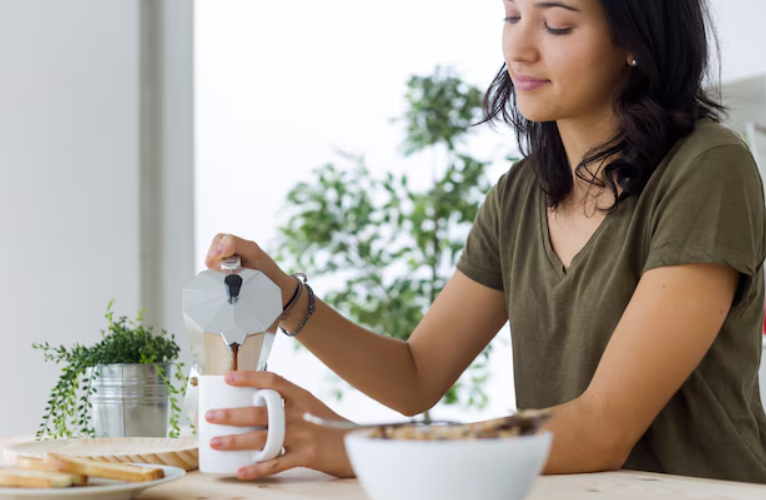Introduction to Gamma-Aminobutyric Acid (GABA) and Its Importance
Gamma-aminobutyric acid (GABA) is a vital neurotransmitter in the brain. It plays an essential role in relaxing the central nervous system, encouraging relaxation, lowering anxiety, and enhancing general wellbeing. As the primary inhibitory neurotransmitter, GABA balances excitatory impulses and reduces excessive neuronal activity. Low levels of GABA have been linked to increased stress, anxiety, and sleeplessness. Fortunately, you can raise GABA levels naturally through dietary changes, lifestyle adjustments, and specific herbs and techniques.
The Benefits of Raising GABA Levels Naturally
Raising GABA levels naturally can significantly impact your physical and mental wellbeing. By eating foods that boost GABA, exercising regularly, practising mindfulness and meditation, and taking herbal supplements, you can support your body’s natural ability to produce GABA. These dietary and lifestyle changes can improve your wellbeing and stress management without the need for drugs or external help.
Ways to Naturally Raise GABA Levels
In this post, we will explore various natural methods to raise GABA levels in the brain. These techniques will help reduce stress, promote relaxation, and enhance mental clarity.
1. Eat Foods That Boost GABA
Certain foods support the body’s natural GABA production. You can gradually increase your GABA levels by including these foods in your diet.
Fermented Foods
Fermented foods are rich in probiotics, which enhance gut health and encourage the synthesis of neurotransmitters like GABA. Since gut bacteria directly affect the brain’s ability to produce GABA, maintaining a healthy gut microbiome is essential for GABA synthesis.
- Kimchi: This traditional Korean dish, made from fermented cabbage and spices, is rich in probiotics that support brain health.
- Yoghurt and Kefir: These dairy products contain living cultures that support gut health and may help increase GABA production in the brain.
- Sauerkraut: This fermented cabbage dish is another probiotic-rich food that can benefit both gut and brain health.
- Miso: Miso is a traditional fermented soybean paste from Japan that contains beneficial microorganisms that may raise GABA levels.
- Tempeh: Made from fermented soybeans, tempeh is a healthy source of probiotics that may aid in GABA production.
Foods High in Magnesium
Magnesium is believed to enhance GABA receptor activity, increasing GABA’s overall effectiveness. By including magnesium-rich foods in your diet, you can promote GABA production and improve its function.
- Leafy Greens: Foods like spinach, kale, and Swiss chard are rich in magnesium, which helps your body produce GABA.
- Nuts and Seeds: Almonds, cashews, and sunflower seeds are high in magnesium, which may help calm the nervous system and elevate mood.
- Legumes: Beans, lentils, and chickpeas are excellent sources of magnesium, which is necessary for GABA receptor activation.
- Avocados: These nutrient-dense fruits, rich in magnesium, are known for promoting mental clarity and relaxation.
- Complex Carbs: Eating foods high in complex carbohydrates helps the body produce more GABA. When broken down, complex carbs produce glucose, the brain’s primary fuel. This helps stabilise blood sugar levels and provides consistent energy for brain function.
Complex Carbohydrate-Rich Foods
- Whole Grains: Foods like brown rice, quinoa, and muesli provide slow-releasing energy that can positively impact neurotransmitter production, including GABA.
- Sweet Potatoes: Packed with nutrients, these root vegetables boost brain function and are a great source of complex carbs.
- Bananas: Bananas provide complex carbohydrates and potassium, supporting the body’s natural GABA production.
2. Engage in Regular Exercise
Exercise is one of the most natural ways to increase GABA levels. Physical activity stimulates the release of GABA, serotonin, and endorphins—neurotransmitters that promote relaxation, pleasure, and elevated mood.
Aerobic Exercise
Cardiovascular exercises like jogging, cycling, swimming, and brisk walking can raise GABA levels. Aerobic exercise promotes relaxation, reduces stress, and improves overall brain function.
Research shows that regular aerobic exercise increases GABA levels in the brain, helping manage stress and reduce anxiety.
Yoga and Tai Chi
Mind-body exercises like yoga and tai chi also raise GABA levels. These practices combine meditation, controlled breathing, and physical movement to support mental relaxation and overall wellbeing.
Studies show that yoga and tai chi raise GABA levels, reduce anxiety, and improve mood. Deep breathing and mindfulness exercises help reduce the body’s stress response, promoting mental calm.
3. Meditation and Mindfulness
Mindfulness and meditation have long been recognised for promoting relaxation, reducing stress, and calming the mind. These practices increase GABA production and encourage a relaxing brain response.

Benefits of Meditation for GABA
Studies have found that regular meditators often have higher GABA levels than non-meditators. Practices like body scans, mindfulness meditation, and guided imagery enhance GABA activity in the brain and reduce the body’s stress response.
Breathwork Techniques to Raise GABA Levels
Breathwork is another effective technique for raising GABA levels. Deep, slow breathing, such as diaphragmatic breathing, activates the parasympathetic nervous system. This system enhances GABA activity and promotes relaxation.
Mindfulness-Based Stress Reduction (MBSR) and GABA
Mindfulness-Based Stress Reduction (MBSR) is a programme that incorporates body awareness, yoga, and mindfulness meditation. It has been shown to increase GABA levels, significantly reducing anxiety and improving emotional regulation.
4. Supplements Made of Herbs
Many natural vitamins and botanicals are known to increase GABA levels and encourage relaxation. The following plants are commonly used for this purpose:
1. Valerian Root
Valerian root has been used for generations as a natural remedy for anxiety and insomnia. It is believed to raise GABA levels in the brain by preventing the breakdown of this neurotransmitter, enhancing its calming effects.
Studies show that valerian root increases GABA levels in the central nervous system, which may reduce anxiety and improve sleep.
2. Passionflower
Passionflower has long been used to relieve uneasiness, anxiety, and sleeplessness. It raises GABA activity in the brain, providing a soothing effect on the body and mind.
Research suggests that passionflower may improve GABA receptor binding, offering a relaxing effect that can help with anxiety and stress symptoms.
3. Ashwagandha
Ashwagandha is an adaptogenic herb that helps the body cope with stress. It increases GABA activity in the brain, reducing anxiety and elevating mood.
Studies show that ashwagandha supplements may promote mental clarity and relaxation by raising GABA activity and lowering cortisol levels, the stress hormone.
4. L-theanine
L-theanine, an amino acid found in green tea, is well-known for relaxing the brain. It encourages the synthesis of dopamine, serotonin, and GABA, which improve mood and reduce stress.
L-theanine raises GABA levels without causing the calming effects of other sedatives, helping people relax and feel less anxious.
5. Hygiene of Sleep
Maintaining proper sleep hygiene is essential for sustaining appropriate GABA levels. Inadequate sleep and sleep deprivation negatively affect neurotransmitter synthesis, especially GABA. By following good sleep habits, you can increase GABA production, benefiting both mental and physical health.
Advice for Improved Sleep Hygiene
- Keep a consistent sleep schedule by going to bed and waking up at the same time each day.
- Establish a calming bedtime ritual, such as reading or listening to soothing music.
- Avoid large meals and stimulants like caffeine close to bedtime.
- Ensure your sleep environment is comfortable, dark, and quiet.
6. Cut Back on Caffeine and Alcohol Use
Caffeine and alcohol can affect GABA levels. Chronic alcohol consumption gradually decreases GABA levels, increasing stress and anxiety, even though alcohol initially has a calming effect by boosting GABA activity. On the other hand, caffeine increases excitatory neurotransmitters like glutamate, which may negate GABA’s relaxing benefits.
How to Handle Alcohol and Caffeine
- Avoid caffeine later in the day to prevent sleep interference. Limit your daily intake to one or two servings, preferably in the morning.
- Limit alcohol consumption and avoid using it as a way to cope with anxiety or stress. Frequent alcohol use can negatively impact GABA production over time.
